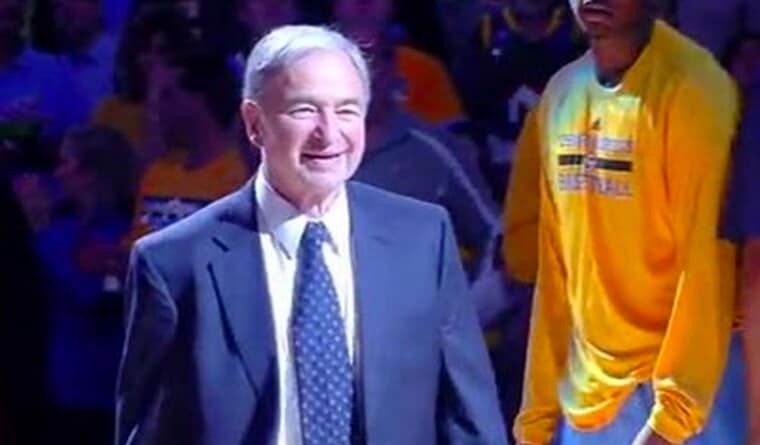When Carl Scheer joined the Denver Nuggets as president and general manager in 1974, his mantra was simple: Do whatever it takes to survive. “There were a few years where there were talks about moving the team and shaky ownership. He made sure the team was kept here,” Denver Nuggets’ Vice President of Basketball Administration Lisa Johnson said. “He's a huge part of the history of the Denver Nuggets. Very responsible for bringing it here and keeping it here.” There’s a funny story former Nuggets player Bill Hanzlik shared to describe just how dedicated Scheer was in keeping the Denver Nuggets alive. Before every home game, Scheer would receive the attendance numbers in his courtside seat at the old McNichols Sports Arena. If the number was below 10,000, he would scribble it out and write a more generous number like 13,985 and hand it to the PA announcer to say on the loudspeaker. For Scheer, it wasn’t about trying to lie about ticket sales. Rather, it was about fighting to sell the Nuggets as an experience that people in the Mile High City should want to be a part of. He was passionate about making professional basketball work in a city where it previously struggled. “Carl was the consummate marketeer,” Hanzlik said. “The Nuggets were bleeding in the red at that point and financially, they would always have one more investor [to keep the team alive].” On Saturday, Dec. 14, 2019, Scheer died at the age of 82 in his home in Charlotte, N.C. Hanzlik and Johnson, both feel indebted to the former Nuggets executive. During Scheer’s 10-year run, he hired Johnson on the spot after just one interview to work as a ticket sales representative and traded for Hanzlik. Both still have ties to the organization to this day. Johnson is now in her 39th season with the Nuggets and is a trailblazer as one of the few women executives in sports. READ MORE: Five Questions: Lisa Johnson Hanzlik played for the Nuggets for eight seasons and was named to the NBA All-Defensive Second Team in 1988. He remains associated with the franchise as a broadcaster for Altitude TV. Scheer’s influence in Denver was far-reaching. During the 1980s, professional teams weren’t the multi-billion-dollar entities that they are now. The Nuggets, in the late 70s and early 80s, were strapped for cash and often relied on last-minute investments to stay in business. Scheer fought to give a brand identity that would resonate not only in Denver but get it viability to basketball fans in general. “He was a thinker,” Hanzlik said. “Even when you were talking to him, you could always tell he was thinking 'how can I use this [as an advantage]?'” One example is the rainbow jerseys donned by the Nuggets in the 1980s. In trying to find ways to generate excitement, Scheer ran a fan contest to give the Nuggets a more vibrant feel. A local art student pitched the multicolor scheme and the rest is history. “Carl, thinking outside the box [went for it], it was a seven-color logo and that's very expensive to produce,” Johnson said. “It was a logo and color scheme that no one ever had.” Without that bold gamble, an extremely valuable trend that defined the high-scoring 80s era wouldn’t have been invented. Neither would the city edition jerseys of the past two years, merchandise that has helped in generating excitement for the current Nuggets team. “Fans, players, everyone loves that rainbow logo. It's different and really speaks to the Denver Nuggets,” Johnson said. Countless other stories showcase just how valuable Scheer was to the Nuggets’ organization. Due to his sizable influence on Denver’s sports scene, Scheer was inducted into the Colorado Sports Hall of Fame in 1992. He was also honored by the Nuggets in a ceremony in 2014. “He just loved basketball and loved being involved with it,” Hanzlik said. “He was sort of disheveled, wrinkled shirts, tie in the wrong spot but he was constantly working, constantly thinking about how he could get a few more tickets sold.” Scheer’s contributions to the NBA extended outside of the Mile High City as well. He was the inventor of an NBA All-Star Weekend staple with the dunk contest in 1976 and helped the fledging Charlotte Hornets launch successfully in 1988. The Nuggets were fortunate to have an innovative mind in a critical period of their history. “I mean this in the nicest way, but he was a character and he believed in this team,” Johnson said. “He was passionate about this team and this city.”
